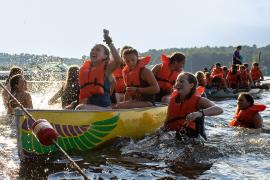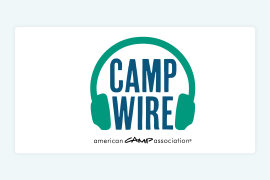We made it! After a challenging, frustrating, and uncertain past 15 months, summer 2021 is finally approaching, and we’re all looking forward to regaining some sense of “normalcy” during this camp season. And while this summer is still going to function a bit differently than we’re all used to, we’re all going to be doing everything in our power to ensure that it feels the same as it always has — because creating accessible, inclusive, and supportive communities is what makes camp the magical place that it is, and always has been.
That said, there were a number challenges our industry was faced with before the pandemic, and none was more universally discussed than the concept of staff mental health. The overwhelming majority of camps I worked with in 2018 and 2019 cited “staff mental health” as one of, if not their top, concern. And that was all before we were all told to stay indoors and away from our friends and family. So now that we are finally faced with a glimmer of light at the end of this year-long tunnel, it’s time to shift our focus to how we can help develop a resilient staff with staying power — not just for this summer, but for future summers as well.
In recent years, there has been a noticeable shift in the mindset of dissatisfied staff, particularly at day camps: where we used to lament the counselors who would “quit and stay,” we’re now faced with staff members who simply “walk away” (meaning they quit entirely). This trend is tied to an overall lack of “professional resiliency,” which can be loosely defined as, “the ability to commit to, and stick with, a job.” A study conducted by the Society for Human Resource Management found that Gen Z (also known as the majority of your staff) is more stressed about work than previous generations, and almost 40 percent claim that their anxiety is their greatest concern, while over 25 percent feel that they are “unprepared to work.” 1
So . . . with your staff team (mostly) intact as the summer approaches, what can you do to ensure that your entire team feels supported, competent, and a sense of pride in what they’re doing? I’ll tell you the same thing I’ve been telling people for years: we need to be teaching our staff how to receive feedback! Sure, your leadership orientation is great; those eval role-playing exercises never get old, right? But how many of you are taking the time to train the people being given the evaluations? A crucial part of the feedback process is making sure that everyone not only understands their expectations, but also the process itself.
Instilling a sense of professional resiliency is something that may impact your staff on an individual basis, but the real work takes place at a cultural level: this process can take years to develop, but a great place to start is by running a session during staff orientation that focuses on the feedback culture at your camp. By clearly defining the way your community provides, receives, and utilizes feedback, you can establish a standard that is open and forward-thinking, driven by the understanding that feedback is an offering, not an attack, and that it exists to help us grow as a team.
If you’re still unsure what this could look like, here are three things you can easily implement at camp this preseason:
- Evaluation Session — If you’re not already doing so, you need to spend time reviewing your evaluation process during staff orientation, including any actual form(s) you use during formal evaluations. If the first time a counselor sees your evaluation form is during their first evaluation, you are failing to set them up for success.
- Feedback Preference Form — Unsure how to effectively tell your staff what they need to hear? Ask them! Giving staff members the chance to tell you how they like to receive critical (and positive) feedback not only better prepares you to manage them, it also gives them a sense of ownership, and further reinforces that you take their development seriously. This can be a very simple and meaningful way to help create buy-in.
- Put Yourself in the Spotlight — A significant part of the feedback process is that it must, at least on some level, work both ways. Give your staff multiple chances to provide feedback on their experience, which can help improve both this summer, as well as future ones. If your staff feel like their voices are being heard, they are much more likely to remain invested in what they’re doing: both during this summer, and beyond!
Camp this summer will come with a number of challenges, but also a number of opportunities. Now more than ever, fostering a supportive community, with a staff culture grounded in feedback and open communication, is going to play a major role in the success of your program in 2021. So, the opportunity is there — now go out there and seize it!
This blog was written on behalf of Project Real Job’s efforts to help camps recruit, hire, and retain staff.
A former Camp Director, Max Claman has been working in the camp industry for over a decade, currently serving as a consultant. Max works with camp and education organizations and their leadership to design and enhance their programming, and serves as a presenter and author.
He can be reached at [email protected].
1 shrm.org/ResourcesAndTools/hr-topics/employee-relations/Pages/Gen-Z-worries-about-work-skills.aspx
Photo courtesy of Camp Newaygo in Newaygo, Michigan
The views and opinions expressed by contributors are their own and do not necessarily reflect the views of the American Camp Association or ACA employees.




